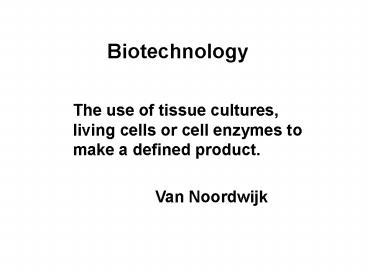Biotechnology - PowerPoint PPT Presentation
1 / 22
Title:
Biotechnology
Description:
371 biotechnology medicines in development for new treatments of nearly 200 diseases ... Amino acid sequence of bovine and swine insulins differed from the human ... – PowerPoint PPT presentation
Number of Views:41
Avg rating:3.0/5.0
Title: Biotechnology
1
Biotechnology
- The use of tissue cultures, living cells or cell
enzymes to make a defined product. - Van Noordwijk
2
Major Techniques of Biotechnology
Recombinant DNA technology (cloning) Polymerase
chain reaction (PCR) Monoclonal
antibodies Nucleotide blockade (antisense,
iRNA) Gene therapy Genomics Combinatorial
chemistry Carbohydrate chemistry Protein
engineering Molecular modeling Small-molecule
chemistry
3
Pharmaceutical Biotechnology
- The use of tissue cultures, living cells or cell
enzymes to make a drug, therapy or diagnostic.
4
Why do pharmacy students need to study
Pharmaceutical Biotechnology?
New drug development Educating health care
workers patients Managing cost of medicine
5
Biotech Drug Development 2002
371 biotechnology medicines in development for
new treatments of nearly 200 diseases 250
million people have already benefited from
medicines and vaccines developed through
biotechnology
6
Biotechnology Medicines/Vaccines in
Development by Therapeutic Category
PhRMA 2000 survey
7
Biotechnology Medicines/Vaccines in
Development by Product Category
PhRMA 2000 survey
8
(No Transcript)
9
Important Dates in the Development of
Biotechnology
1953 Double helical structure of DNA
discovered 1971 Restriction enzymes
discovered 1975 Monoclonal antibodies
produced 1977 First human gene cloned 1982
Recombinant human insulin approved by
FDA 1986 PCR invented 1990 First human gene
therapy trial 1996 Yeast genome sequenced 1997
First mammal cloned from adult cells 2000
Sequence of human genome identified
10
Human Insulin (Humulin)
- First FDA approved drug produced by rDNA
technology (1982) - Insulin was extracted from the pancreas of cows
and pigs - Amino acid sequence of bovine and swine insulins
differed from the human sequence by a few amino
acids
11
Human Insulin (Humulin)
- Some diabetics produced antibodies to the animal
insulin resulting in serious immune reaction - Humulin eliminates adverse immune response to
animal insulin - No longer rely on animal sources for insulin
12
Human growth hormone (HGH)
- GH (pituitary gland) important regulator of
growth during development - Children born with growth hormone deficiency
become dwarfs - Regular injections of GH during development
restores natural growth
13
Human growth hormone (HGH)
Animal-derived GH is ineffective in humans HGH
isolated from the pituitary glands of human
cadavers Increased incidence of
Creutzfeldt-Jakob disease in patients received
HGH
14
Human growth hormone (HGH)
- Researchers isolated 5 mg growth hormone from
500,000 sheep brains - Bacteria can produce a billion copies in 15 h.
One gallon of the engineered bacteria can produce
the 5 mg of GH
15
Biological Response Modifiers
- Endogenous proteins stimulate the formation of
blood cells during hematopoeisis - Through rDNA, possible to produce quantities
necessary to treat patients - Reduce infections in patients with AIDS,
infectious diseases and cancer chemotherapy
16
Herceptin
New targeted cancer treatment for certain breast
cancers Monoclonal antibodies (MAbs) as magic
bullets for cancer treatment? Lack of tumor
antigens Immune response to murine MAbs
17
Herceptin
Herceptin as humanized MAb Targets the product
of the Her-2 gene in breast cancer
18
Major Techniques of Biotechnology
Recombinant DNA technology (cloning) Polymerase
chain reaction (PCR) Monoclonal
antibodies Nucleotide blockade (antisense,
iRNA) Gene therapy Genomics Combinatorial
chemistry Carbohydrate chemistry Protein
engineering Molecular modeling Small-molecule
chemistry
19
General Techniques for Development of
Humulin (or any protein)
Identify the insulin gene, i.e., find it Isolate
the human gene Sequence the gene Clone gene into
expression vector Express biologically active
insulin in cells Purify protein for clinical use
20
Pharmaceutical Biotechnology
The use of tissue culture, living cells or cell
enzymes to produce a drug, therapy or
diagnostic. Types of cells bacteria yeast in
sect cells mammalian cells plant cells
21
The Central Dogma
22
(No Transcript)































